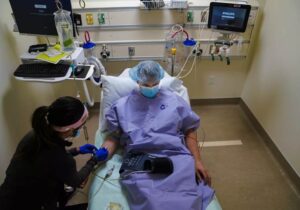Support is essential to help navigate the many challenges of a serious illness. Illness can bring difficult treatments, painful side effects, and patchy recovery periods. Asking for and accepting help, however, is often complicated because we value our independence.
Admitting a need for help is acknowledging our sense of self has changed. This is a hard reality to face. And yet, based on interviews with people facing serious health challenges, this journey is best managed with support.
These powerful narratives, based on patients’ experiences, deliver critical insights for times of serious illness.
Asking for Help During Times of Serious Illness
Jackie’s breast cancer diagnosis changed quickly from a relatively straight forward procedure to Stage III-A cancer with activity in the lymph nodes requiring both chemotherapy and radiation. As a result, the number of people Jackie informed about her cancer expanded.
Although Jackie has a large family that live close by, as a single working mother she knew she would need additional help … “and the next thing I knew, people are bringing food, especially after the surgeries and I’m getting cards and e-mails or texts of support, I mean it was huge.” Asked what this type of support meant to her, Jackie replied: “It meant everything.”
Brea required brain surgery for a malformation that was causing life-threatening symptoms. As a mother of two young children, Brea knew she would need help:
…. this was something I couldn’t tough out, and I had to ask for help, and that’s hard….That’s hard for me … [but] I had to. I had no choice… I had a two-month-old, a two-year-old and, it wasn’t just me. I had to think about them, and I had to think about my husband, who had to eat. [LAUGHS] He doesn’t cook. And, so I had no choice. I had to ask for help.
Brea
In both of these situations, asking for help provided the support needed to allow Jackie and Brea to focus on treatment and recovery during a serious illness.
Accepting Help During a Serious Illness
A stroke turned Nora’s life upside down. Normally a very active and independent person, Nora’s stroke delivered a sudden and dramatic change. Additionally, in her job as a nurse Nora takes care of others. Nora found it a difficult and uncomfortable challenge to be in a position of needing, let alone accepting, help.
When Nora returned home from the rehabilitation center friends would offer to drive her places, go for walks, and bring food. At first, she was reluctant to accept these offers of support. But this changed, as she told me:
I’ve allowed myself to do that because they, they wouldn’t be offering if they didn’t want to do it … I’m really independent, I don’t like to be a burden to people, so that’s been, … it’s just a different experience for me.
Nora
Accepting help is difficult because it is an admission that things are not right.
Joseph’s sarcoidosis, an autoimmune disease where tiny clumps of inflammatory cells negatively impact different parts of the body, often sent him to the hospital. During these hospital stays, Joseph’s friend Dave would sit with Joseph whether he was awake or not. Joseph would try to send him home, “there’s no reason to come here because I’m going to be asleep most of the time.”
And yet, when Joseph would wake, “There’s Dave setting in the corner.” Joseph adds: “…at the time it just felt like this was ridiculous, why doesn’t he go home to be with his family. But then you realize how much that was an aid to you…sometimes the help that I received, I only understood the power and impact of it retrospectively….it was critical.”
Support Provides Relief for Caretakers
When Lena began chemotherapy for Stage IV colon cancer, she considered her job “was to take care of myself and rest, and that’s what I did.” As the chemo continued, the effects got worse and Lena would be knocked down for days.
During treatment, Lena had three children still living at home, and her husband worked full-time. As her husband noted, “how am I supposed to keep working and take care of you and take care of everybody else?” So when people offered to help, Lena’s husband gratefully accepted.
Meals were delivered two to three times a week from October to June. Four women took turns each week with the laundry until Lena’s children took over this responsibility. And another woman came over to clean just the first floor of the house. As Lena observes,
…it’s just how people, how people want to help, and they just so want to help and I think it’s important to let them help. Because I know people that keep things to themselves and don’t let people know what’s going on with their family and don’t know how to accept the help. And, we did. We just let anybody do whatever they wanted to do, and my, cancer battle was a very public battle with everything that my husband would write on, the Caring Bridge and everything. It was, we were very open with it, and I think people appreciated that and felt a part of it.
Lena
Accepting offers of help provides much needed relief to the primary caretakers of those with serious illness.
5 Points to Consider When Help is Offered
- People offer support because they genuinely care and want to help
- Offers of help provide needed relief and support, not just for the patient, but caretakers and family members as well
- Support allows the patient to focus on treatment and recovery
- ‘Share what types of support may be needed. People may offer to help but don’t know what needs to be done. Others may not offer because they don’t know what may be needed.
- Accepting help can provide unanticipated gifts both for you as well as those providing support.
When illness strikes, it is difficult to acknowledge that help may be needed, that you can’t do this all on your own. Support during a serious illness, however, allows the focus needed to optimize treatment and recovery.
* Quotes in this post are from interviews conducted for my book, Navigating Illness: The Patient Experience, a work in progress. Names were changed upon an individual’s request.



